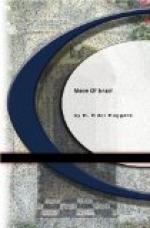“I do not know how you can say such a thing, Scribe, still I ask you to say it if you can. As to why I fear, it is because I seem to feel the near shadow of some woman lying cold upon me and building a wall of blackness between his Highness and myself.”
“It is but a dream, Princess.”
“Mayhap. I hope so. Yet I think otherwise. Oh! Ana, cannot you, who study the hearts of men and women, understand my case? I have married where I can never hope to be loved as other women are, I who am a wife, yet not a wife. I read your thought; it is—why then did you marry? Since I have told you so much I will tell you that also. First, it is because the Prince is different to other men and in his own fashion above them, yes, far above any with whom I could have wed as royal heiress of Egypt. Secondly, because being cut off from love, what remains to me but ambition? At least I would be a great queen, as was Hatshepu in her day, and lift my country out of the many troubles in which it is sunk and write my name large upon the books of history, which I could only do by taking Pharaoh’s heir to husband, as is my duty.”
She brooded a while, then added, “Now I have shown you all my thought. Whether I have been wise to do so the gods know alone and time will tell me.”
“Princess,” I said, “I thank you for trusting me and I will help you if I may. Yet I am troubled. I, a humble man if of good blood, who a little while ago was but a scribe and a student, a dreamer who had known trouble also, have suddenly by chance, or some divine decree, been lifted high in the favour of the heir of Egypt, and it would seem have even won your trust. Now I wonder how I shall bear myself in this new place which in truth I never sought.”
“I do not know, who find the present and its troubles enough to carry. But, doubtless, the decree of which you speak that set you there has also written down what will be the end of all. Meanwhile, I have a gift for you. Say, Scribe, have you ever handled any weapon besides a pen?”
“Yes, your Highness, as a lad I was skilled in sword play. Moreover, though I do not love war and bloodshed, some years ago I fought in the great battle between the Ninebow Barbarians, when Pharaoh called upon the young men of Memphis to do their part. With my own hands I slew two in fair fight, though one nearly brought me to my end,” and I pointed to a scar which showed red through my grey hair where a spear had bitten deep.
“It is well, or so I think, who love soldiers better than stainers of papyrus pith.”
Then, going to a painted chest of reeds, she took from it a wonderful shirt of mail fashioned of bronze rings, and a short sword also of bronze, having a golden hilt of which the end was shaped to the likeness of the head of a lion, and with her own hands gave them to me, saying:




